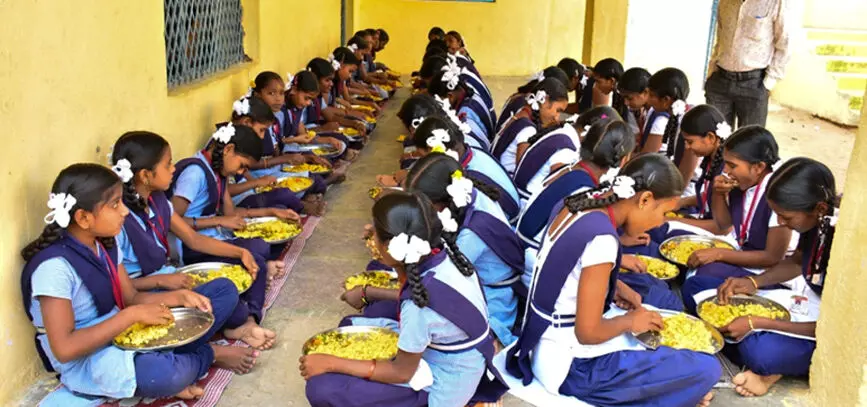Avoid Akshaya Patra, let local cooks make mid-day meals in Telangana schools: citizens urge CM
The government has plans to expand the centralised kitchen model to the rest of the State as well
By Kedar Nadella
Representational Image.
Hyderabad: Chief Minister A Revanth Reddy has been urged to withdraw the decision to promote centralised kitchens run by private religious organisations to prepare mid-day meals for schoolchildren.
An open letter signed by several members of people’s organisations and social movements such as Prof. Padmaja Shaw and SQ Masood asked the government to follow decentralised kitchen models where local cooks at the schools can be in charge of cooking for children.
The letter was regarding the Akshaya Patra, an affiliate of the ISKCON foundation, recently announcing their partnership with the State government to provide breakfast and lunch to schoolchildren in Kodangal, the chief minister’s constituency.
The government has plans to expand the centralised kitchen model to the rest of the State as well.
“We appreciate the government’s pilot initiative towards introducing breakfast in schools, and we hope this is soon expanded to cover all schools in the State. However, we are deeply concerned with the attempts at moving towards a centralised kitchen model in partnership with private and religious organisations, rather than strengthening the current system of local communities and women cooking in schools, in a decentralised manner,” the letter said.
What does the Food Security Act state?
In the open letter, the intellectuals highlighted that decentralised kitchen models are necessary to achieve food security for all children in Telangana.
Quoting the National Food Security Act (NFSA), 2013, the letter said that ‘every school, referred to in clause (b) of sub-section (1), and anganwadi shall have facilities for cooking meals, drinking water and sanitation:
The act also stated that ‘in urban areas, facilities of centralised kitchens for cooking meals may be used, wherever required, as per the guidelines issued by the Central Government.’
Private entities influencing food habits
The letter's signatories raised concerns about religious organisations making the meals forcing ‘their own agenda and food opinions’ on local communities.
“For instance, this foundation (Hare Krishna Foundation) in Karnataka refused to include onion-garlic in the food, as these are believed to be not ‘satvik’. Furthermore, these organisations do not serve eggs and meat due to their religious beliefs. We have learnt of similar experiences from Jharkhand as well, and the same is being resisted by many Adivasi students,” the letter stated.
The letter also mentioned the allegations against ISKCON and Akshaya Patra for collecting ‘unauthorised and illegal donations from the public’. They stated that outsourcing important programmes such as mid-day meals to private entities with a ‘questionable background’ will drain valuable public funds.
Think twice, says RS Praveen Kumar
The issue was also raised by BRS leader RS Praveen Kumar who took to X to urge the State government to ‘think twice’ before any food preparation contract to Akshaya Patra.
Referring to recent local news reports about the team from Hare Krishna Foundation meeting CM Revanth Reddy regarding the implementation of the mid-day meal scheme, Praveen Kumar asked if serving meat/fish/egg to students, in addition to leafy vegetables and cereals, will stop once Akshaya Patra takes over this mid-day meals scheme. “What if children do not like the food which they propose to provide?” he asked.
Instead, he suggested an increase in the menu charges to provide wholesome food (including meat) through trained parent committees in every school daily.
The letter requested the government to strengthen the decentralised model of providing mid-day meals, by taking care of some of the pending issues such as adequate and timely payment of salaries to cooks and helpers, inflation-indexing of cooking costs, increasing staff, strengthening human resources and infrastructure in schools, timely release of funds, and strengthening monitoring and community-based social audit etc.
How decentralised kitchens can help schoolchildren?
In the letter, the signatories highlighted the benefits of employing local cooks with a preference being given to cooks from Dalit, Adivasi and Bahujan communities:
- The food can be prepared according to local tastes, contexts and preferences using fresh ingredients. The food can be prepared fresh, nutritious and hot.
- Employment opportunities created for the local community, including women.
- Parents, teachers and school management committees can monitor the quality and preparation of the meals.
- Nutrition education and kitchen gardens can be integrated with the mid-day meals.
- Age-old and unconstitutional caste norms can be broken, with all children being served the food, often cooked by Dalit, Adivasi and Bahujan cooks.
Disadvantages of using centralised kitchens
They also listed issues they claimed the children will face due to centralised kitchens:
- Food will be often stale and unpalatable and will not contribute to the local economy and livelihoods.
- It will be difficult for local communities to monitor to process, and therefore there will be no system of accountability to the community. There will also be no transparency in the appointment of cooks, and fewer jobs will be created
- Transportation costs and overheads will increase.
- There will be less involvement of the local community towards social inclusion.